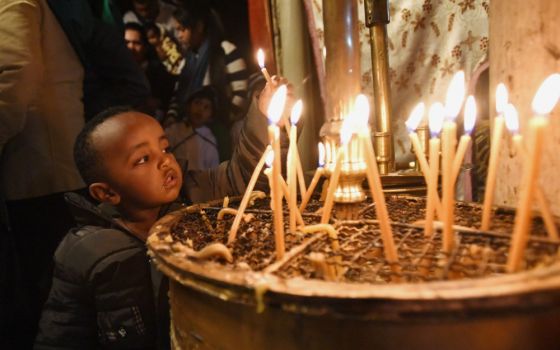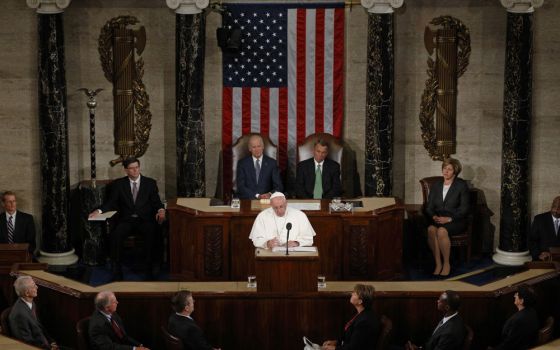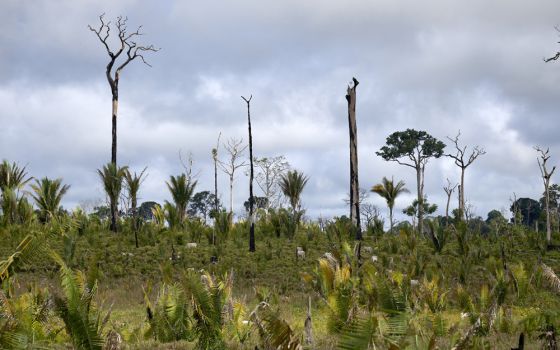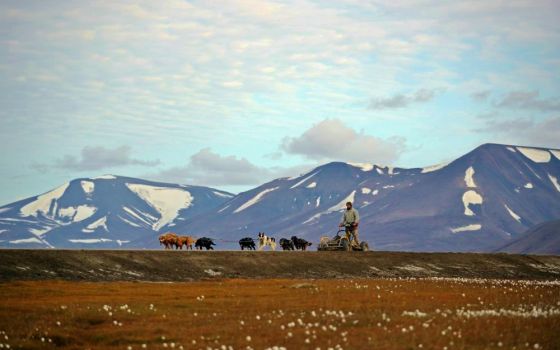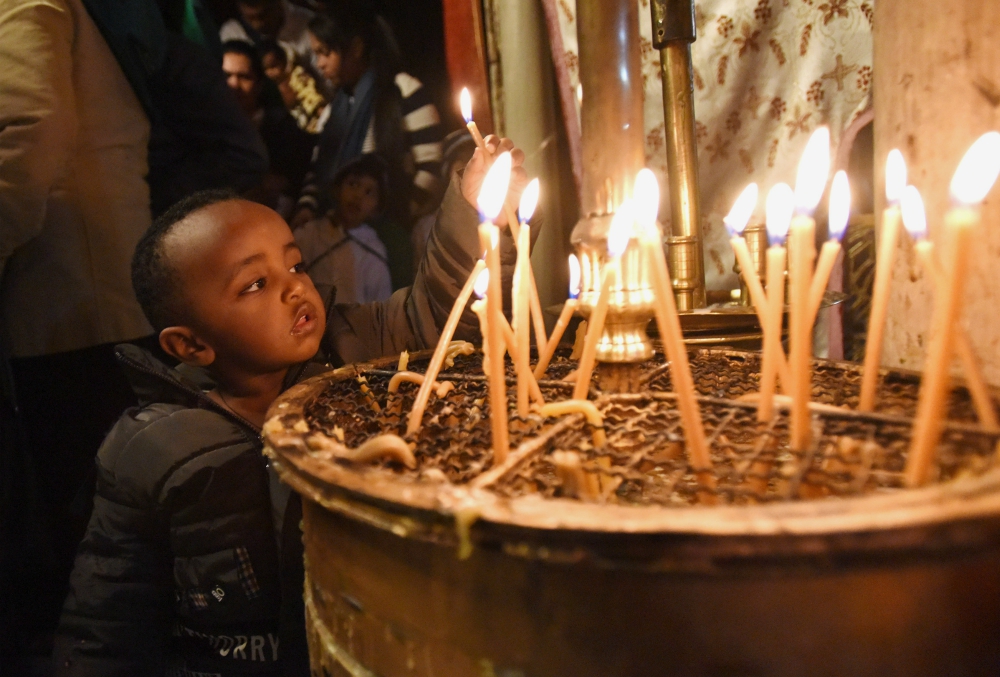
An Ethiopian boy lights a candle in the grotto in the Church of Nativity in Bethlehem, West Bank, Dec. 15, 2018. The church is built on the site believed to be where Jesus was born. (CNS/Debbie Hill)
Editor's note: NCR is sharing Advent reflections based on "Laudato Si', on Care for Our Common Home," by former NCR editor and publisher Arthur Jones. These were originally published in 2015 by St. Vincent de Paul Parish Community in Baltimore. He wishes to acknowledge the inspiration of the Celtic invocations of Alexander Carmichael's Carmina Gadelica. You'll find an introduction to the series here, the first installment here, the second one here and the third one here.
There is an artistry, almost a forceful blank verse poetic quality to sections of the pope's Laudato Si' encyclical. What Pope Francis has been doing — to borrow from Sr. Wendy Beckett again — is "to carry us away from the limitations of what we already know and believe, and set us free in the infinities of a deeper vision." He attempts to "set us free" with his own:
A prayer for our earth
All-powerful God, you are present in the whole universe
and in the smallest of your creatures.
You embrace with your tenderness all that exists.
Pour out upon us the power of your love,
that we may protect life and beauty.
Fill us with peace, that we may live
as brothers and sisters, harming no one.
O God of the poor,
help us to rescue the abandoned and forgotten of this earth,
so precious in your eyes.
Bring healing to our lives,
that we may protect the world and not prey on it,
that we may sow beauty, not pollution and destruction.
Touch the hearts
of those who look only for gain
at the expense of the poor and the earth.
Teach us to discover the worth of each thing,
to be filled with awe and contemplation,
to recognize that we are profoundly united
with every creature
as we journey towards your infinite light.
We thank you for being with us each day.
Encourage us, we pray, in our struggle
for justice, love and peace.
As we enter the final Advent week, let us momentarily return to the beginning, to ask about Francis himself. What brought him to do this? Here is the comparison. In 1968, the Rev. Martin Luther King declared, "I have been to the mountaintop." With Laudato Si', the pope does not tell us where he stood, or knelt, to see so clearly a world and its people headed to the brink of no return ecologically.
The pope is telling us that even if the world were totally at peace, Mother Earth is entering an era that, unless prevented, unless we withdraw, means disaster.
Deliberately, he has not made this encyclical triple-layered by adding the constant state of wars and threats of more fearful ones to come. This — now we've shared his deepest anxieties — is the moment when we can rightly ask what in his own experience has brought him to this. And the only answer we have is the one we had at the start. He saw what was happening where he lived, and realized it was universal.
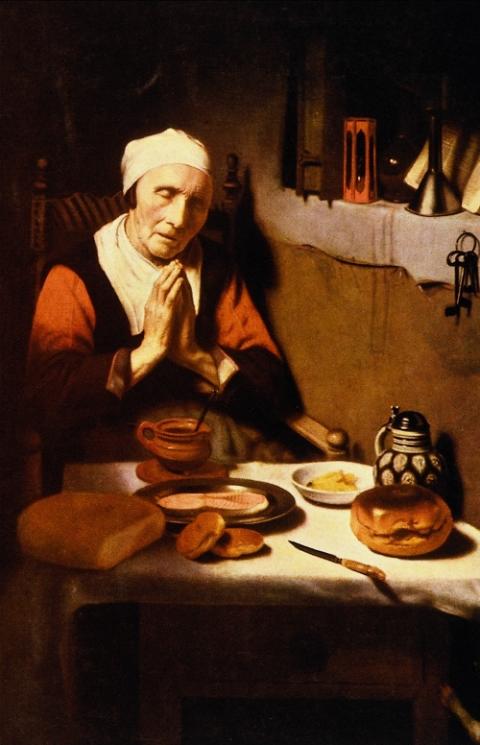
"Old Woman in Prayer" (detail, circa 1656) by Nicolaes Maes (Wikimedia Commons)
He has seen the worst of the 20th century, and sees worse for the 21st century in his, and our, newly gained knowledge of Mother Earth's deprivation. He sees this not as an alarmist, but as a realist.
Francis asks us to consider one specific that we reintroduce, if we do not already practice it: the grace before and after meals. Aside from the actual blessing involved, one can understand his thinking.
Here's the analogy: Recycling will not save the world, but recycling is a constant reminder the world needs saving. Grace at mealtimes will not save the global population, but, in the pope's words, "that moment of blessing, however brief, reminds us of our dependence on God for life; it strengthens our feeling of gratitude for the gifts of creation; it acknowledges those who by their labors provide us with these goods; and it reaffirms our solidarity with those in greatest need."
For the reflections in the Advent week ahead, the titles after the name of each day are from the encyclical section itself. See how Francis is making the shift obvious, from teacher to pastor.
Prologue to the fourth week: Ecological conversion
The pope says he "would like to offer Christians a few suggestions for an ecological spirituality grounded in the convictions of our faith, since the teachings of the Gospel have direct consequences for our way of thinking, feeling and living."
Francis is convinced that "the rich heritage of Christian spirituality, the fruit of twenty centuries of personal and communal experience, has a precious contribution to make to the renewal of humanity."
Once more, he turns to St. Francis. He again insists, "We come to realize that a healthy relationship with creation is one dimension of overall personal conversion, which entails the recognition of our errors, sins, faults and failure, and leads to heartfelt repentance and desire to change."
He happily quotes the Australian bishops, who said, "To achieve such reconciliation, we must examine our lives and acknowledge the ways in which we have harmed God's creation through our actions and our failure to act. We need to experience a conversion, or change of heart."
Individual self-improvement is insufficient; the problems facing the Earth and its people require that we address them by adding our voices and energies to community networks. These problems, he says, cannot be solved, nor seen simply as "the sum of individual good deeds."
O God, let me cultivate ecological virtues.
Sunday, Dec. 22: Joy and peace
"Christian spirituality proposes an alternative understanding of the quality of life," the pope says, "and encourages a prophetic and contemplative lifestyle, one capable of deep enjoyment free of the obsession with consumption."
Making do with less, not aspiring for more than is essential, he continues, "when lived freely and consciously, is liberating. It is not a lesser life or one lived with less intensity. On the contrary, it is a way of living life to the full. ... Happiness means knowing how to limit some needs which only diminish us, and being open to the many different possibilities which life can offer."
"It is no longer enough to speak only of the integrity of ecosystems. We have to dare to speak of the integrity of human life, of the need to promote and unify all the great values. Once we lose our humility, and become enthralled with the possibility of limitless mastery over everything, we inevitably end up harming society and the environment."
Promoting this kind of healthy, humble culture is not possible if we try to do it alone, Francis says, for when we exclude God from our lives or replace God with our own ego, we "think that our subjective feelings can define what is right and what is wrong."
On the other hand, no one can cultivate a sober and satisfying life without being at peace with him or herself. An adequate understanding of spirituality consists in filling out what we mean by peace, which is much more than the absence of war. Inner peace is closely related to care for ecology and for the common good because, lived out authentically, it is reflected in a balanced lifestyle together with a capacity for wonder which takes us to a deeper understanding of life. ... An integral ecology includes taking time to recover a serene harmony with creation, reflecting on our lifestyle and our ideals, and contemplating the Creator who lives among us and surrounds us.
We are speaking of an attitude of the heart, one which approaches life with serene attentiveness, which is capable of being fully present to someone without thinking of what comes next, which accepts each moment as a gift from God to be lived to the full.
We understand the multifaceted problems. It is not an unwillingness to change or assist. It is more a "how?" A pondering within ourselves as to the point, the topic, and the particular communal network we should operate in.
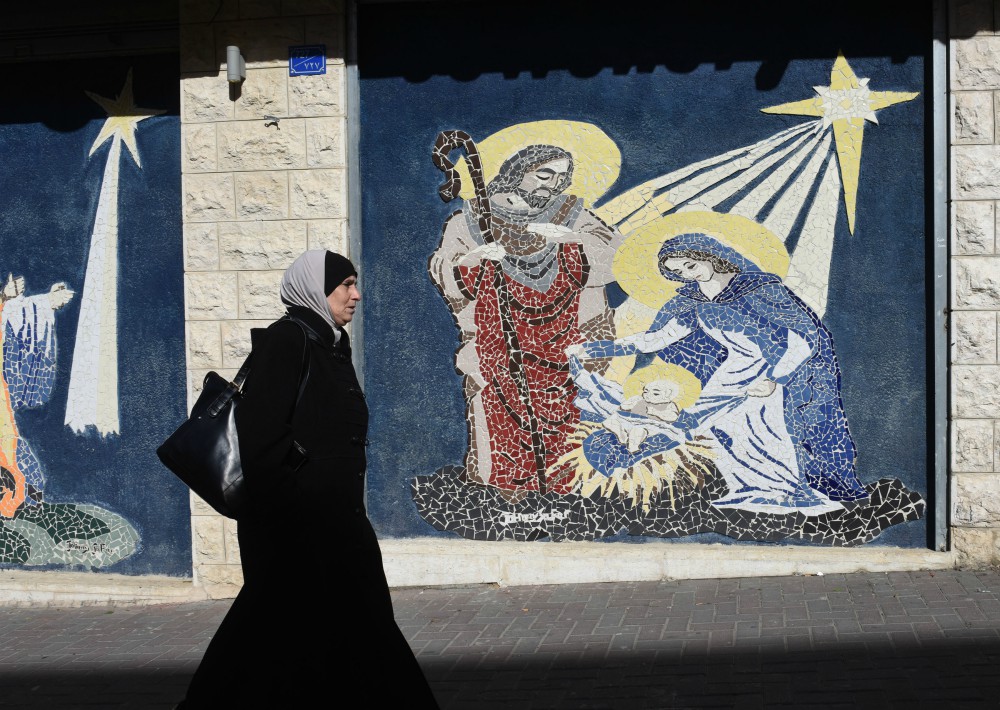
A Palestinian woman walks by a mosaic of the Nativity in Bethlehem, West Bank, Dec. 17, 2018. (CNS/Debbie Hill)
So, no, not a lack of will or understanding, and, yes, I will try to stretch myself further to reach out to meet the needs of others and the world — but I do find my time and my energy finite.
Or am I just making excuses?
(Good question, for Pope Francis warns in this next section: "It is time to acknowledge that light-hearted superficiality has done us no good. ... In the end, a world of exacerbated consumption is at the same time a world which mistreats life in all its forms.")
O God, let me cultivate ecological virtues.
Monday, Dec. 23: Active civic and political love
The pope wants us to exercise big love and little love — be bold about big things, and constantly kind and filled with a caring gesture.
Care for nature is part of a lifestyle which includes the capacity for living together and communion. Jesus reminded us that we have God as our common Father and that this makes us brothers and sisters. ... [In the same way,] gratuitousness inspires us to love and accept the wind, the sun and the clouds, even though we cannot control them. In this sense, we can speak of a "universal fraternity."
We must regain the conviction that we need one another, that we have a shared responsibility for others and the world, and that being good and decent are worth it. We have had enough of immorality and the mockery of ethics, goodness, faith and honesty.
For the one-on-one of daily life, he turns to St. Thérèse of Lisieux: Practice the little ways of love. Do not "miss out on the kind word, a smile, or any small gesture. ... An integral ecology is also made up of simple daily gestures which break with the logic of violence, exploitation and selfishness."
Advertisement
"Love, overflowing with small gestures of mutual care," he says as he urges us on, "is also civic and political, and it makes itself felt in every action that seeks to build a better world. Love for society and commitment to the common good are outstanding expressions of a charity which affects not only relationships between individuals but also 'macro-relationships, social, economic and political ones.' "
Much in the society exploits me and encourages me to exploit myself. I know when I have been exploited.
O God, let me cultivate ecological virtues.
Tuesday, Dec. 24, Christmas Eve: The Trinity, relationships among creatures and the Queen of All Creation
Here, the pope is attempting, for the final time in his encyclical and these reflections, to have us see the entirety of things — that is, everything, living, earthly, cosmic, spiritual — as he sees it.
For Christians, believing in one God who is trinitarian communion suggests that the Trinity has left its mark on all creation. Saint Bonaventure went so far as to say that human beings, before sin, were able to see how each creature "testifies that God is three." The reflection of the Trinity was there to be recognized in nature "when that book was open to man and our eyes had not yet become darkened."
The divine Persons are subsistent relations, and the world, created according to the divine model, is a web of relationships.
What is my relationship with animals? Fondly as pets, otherwise commodities to be exploited? What are my attitudes toward everything that lives, crawls, swims and flies? Can I, like Albert Schweitzer, prize the mosquito? Do I limit my relationship with living creatures the way I do with people? Some I like, some I don't. Can I be all-embracing?
The human person grows more, matures more and is sanctified more to the extent that he or she enters into relationships, going out from themselves to live in communion with God, with others and with all creatures. In this way, they make their own that Trinitarian dynamism which God imprinted in them when they were created. Everything is interconnected, and this invites us to develop a spirituality of that global solidarity which flows from the mystery of the Trinity.
There is a vital element to life that joins with Francis' concern about happiness, and that is laughter. To prove that God has a sense of humor, people will ask: "Have you ever seen a duck walk?"
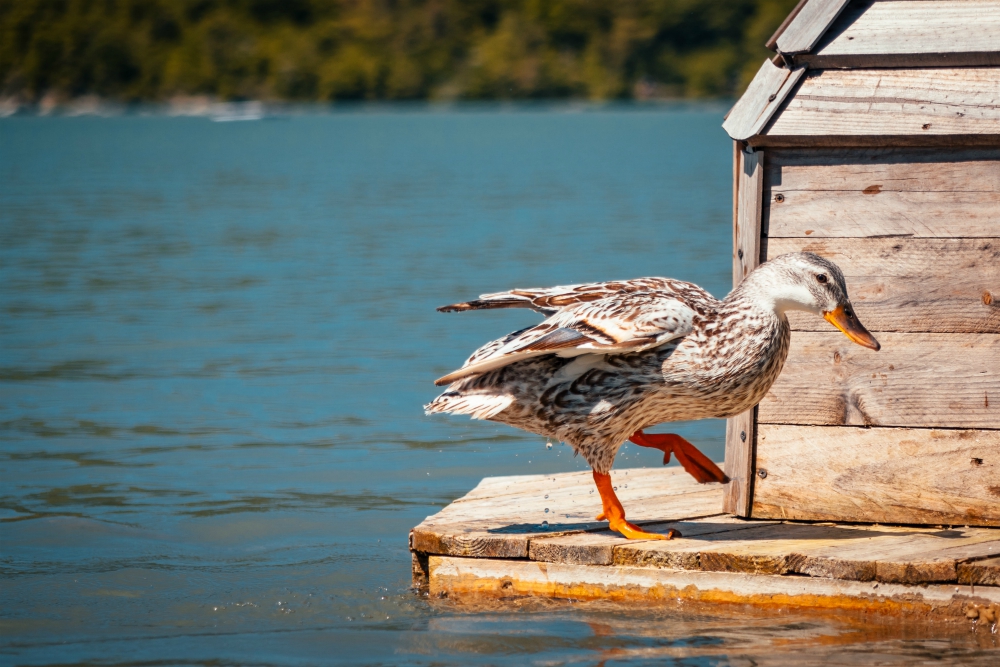
Evidence of divine sense of humor: a walking duck (Unsplash/Mack Fox (MusicFox))
Here's the progression. If we link Francis on the Trinity back to his quoting St. Thérèse on little kindnesses, we also remember the pope was worrying that people are finding less reason to be happy. Thérèse's little kindnesses engender goodnaturedness because kindnesses perceived cause people to smile. And for some people, that smile can produce a good humor quite as easily as fun, laughter, merriment and cheerfulness do.
We have reasons to be cheerful, and to seek humor in life — we are alive, we have the opportunity to be cheerful. We are urged on: "Be of good cheer" (Tobit 7:17); "Cheer the fainthearted" (Thessalonians 5:14); "A cheerful glance brings joy to the heart" (Proverbs 15:30).
This is the juncture at which Laudato Si' meets up again with Advent. The Mary whom Francis heralds as Queen of All Creation is, at this moment, a very humble young Mary, very close to giving birth to her son, Jesus. He will unite us with all creation in an earthly way, but not quite as earthy a way as Mary.
She is the very pregnant Jewish teenager surrounded by animals. She can see some of them by faint oil lamp glow, and undoubtedly she can smell the presence of others — while Joseph shoos away flies and other airborne insects.
For the first time, we perhaps realize there is something so rudimentary about this place and this birth. We realize that we would never have seen Mary in this way, and this setting so clearly — had the pope not written this encyclical.
She is the woman "clothed in the sun, with the moon under her feet, and on her head a crown of twelve stars" (Revelation 12:1), the pope says, "and now understands the meaning of all things. Hence, we can ask her to enable us to look at this world with eyes of wisdom."
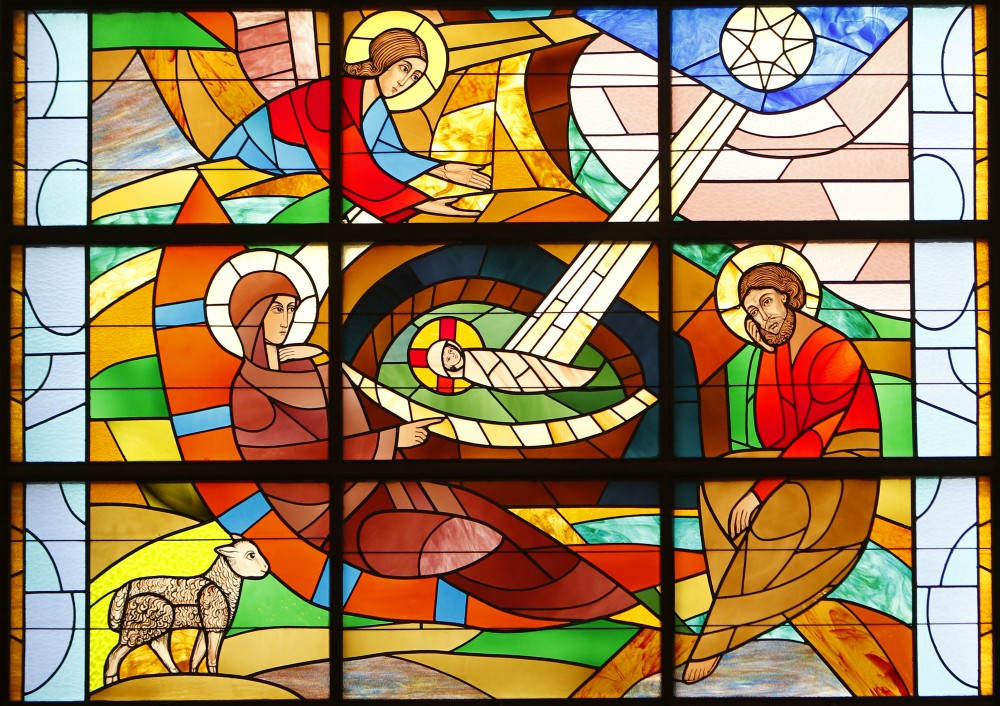
The Nativity is depicted in a stained-glass window at St. George Ukrainian Catholic Church in New York City. (CNS/Gregory A. Shemitz)
Wednesday, Dec. 25, Christmas Day: Beyond the sun
"At the end, we will find ourselves face to face with the infinite beauty of God, and be able to read with admiration and happiness the mystery of the universe, which with us will share in unending plenitude. Even now we are journeying towards the sabbath of eternity," the pope reminds us, "the new Jerusalem, towards our common home in heaven. Jesus says: 'I make all things new.' Eternal life will be a shared experience of awe, in which each creature, resplendently transfigured, will take its rightful place and have something to give those poor men and women who will have been liberated once and for all.
"In the meantime, we come together to take charge of this home which has been entrusted to us, knowing that all the good which exists here will be taken up into the heavenly feast. In union with all creatures, we journey through this land seeking God, for 'if the world has a beginning and if it has been created, we must enquire who gave it this beginning, and who was its Creator.' Let us sing as we go. May our struggles and our concern for this planet never take away the joy of our hope."
How amazing, then, that with his closing segment, "Beyond the Sun," Pope Francis has linked ordinary Christians like us to our near kin — the Celtic Christians.
We return to them because they are us, just in a different time period, a different place, yet relevant to all the Christian world of today, as in the past.
They have given us a perfect prayer with which to conclude this journey with the pope.
I am bending my knee,
In the eye of the Father who created me,
In the eye of the Son who purchased me,
In the eye of the Spirit who cleansed me,
In friendship and affection.
Through Thine own Anointed One, O God,
Bestow upon us fullness in our need,Love towards God,
The affection of God,
The smile of God,
The wisdom of God,
The grace of God,
The fear of God,
And the will of GodTo do on the world of the Three,
As angels and saints
Do in heaven;Each shade and light,
Each day and night,
Each time in kindness,
Give Thou us Thy Spirit.
[Arthur Jones is a former editor and publisher of NCR.]




